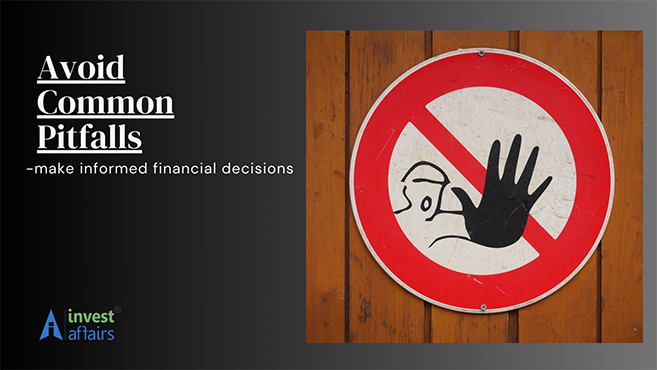WHERE DID ALL MY MONEY GO?
At the end of each month, and sometimes by the middle of a month, many people experience that nagging feeling of confusion and concern about their personal finances. The question, "Where did all my money go?" often echoes in their minds, highlighting the disconnect between income and expenditures. Running low on funds until your salary gets credited is not uncommon. However, it is not wise either. It is important to save and set aside a few extra bucks for unexpected emergencies that may crop up.
Let us look at a case study to understand it. We have clients who have benefitted from our experts’ guidance after entering into this vicious cycle. With able guidance and financial discipline, they have converted this financial trap into their 'Safety Net'. For the sake of confidentiality, we have changed the name and occupation here.
Sarah is a 29-year-old marketing professional living in a metropolitan area. She earns a decent salary but often finds herself bewildered at the end of each month, wondering where all her money has gone. Despite loving her job and having a promising career, Sarah is burdened with huge credit card debt and a lack of savings.
This phenomenon can be attributed to various factors or better still "culprits". This is what we deduced after a long meeting with her where she poured her heart out. And this is not just a one-off case. Many youngsters, young couples as well as a few reckless spenders are sailing in the same boat.
The Reasons
- Minor, Unmonitored Expenditures: Daily indulgences such as gourmet coffee, artisanal snacks, and trivial online purchases can cumulatively burgeon.
- Subscription Services: The insidious monthly fees for streaming platforms, fitness clubs, periodicals, and other subscriptions can surreptitiously drain your budget.
- Dining Out: Habitually patronizing restaurants or opting for takeout over home-cooked meals can profoundly affect your financial health.
- Impulse Purchases: Acquiring items on a whim, especially during promotional events or in moments of stress, can precipitate unforeseen spending.
- Utility and Phone Bills: These recurring expenses can occasionally surpass expectations.
- Transportation Costs: Expenses for fuel, public transportation, ride-sharing services, and vehicle maintenance can accrue significantly.
- Entertainment and Leisure: Expenditures on cinematic experiences, live performances, vacations, and recreational activities can swiftly deplete financial reserves.
- Unexpected Expenses: Unplanned outlays such as medical bills, home repairs, or automotive repairs can severely impact your financial stability.
Possible Remedial Measures
To optimize your financial management, consider these strategic steps:
- Create a Detailed Budget: Examine your income and expenses to understand the flow of your finances. Use advanced apps like ‘investaffairs’ or carefully organized spreadsheets to track your financial activities accurately.
- Set Financial Goals: Clearly define both short-term and long-term financial goals to stay motivated and maintain a sharp focus on your savings journey.
- Review Your Subscriptions: Regularly assess your subscriptions and cancel those that no longer meet your needs or interests.
- Plan Your Meals Effectively: Emphasize cooking at home and carefully organize your meal plans to significantly cut down on expenses from dining out.
- Avoid Impulsive Purchases: Implement a cooling-off period before making non-essential purchases to help reduce impulsive spending tendencies.
- Build an Emergency Fund: Actively work on creating a solid emergency fund to protect yourself against unexpected financial challenges.
Furthermore, if you are among those who often ask this question, then it's time to consider it a red flag that indicates that you are not managing your finances well. It is an indication that you need to cut down on many of your expenses and make more informed financial decisions. Please visit or drop by at www.investaffairs.com, we will be happy to help and guide you.

Common Financial Mistakes People Make
1. Frequently Dining Out Or Socializing At Restaurants/ Pubs/ Bars
Eating out on weekends or meeting up with friends at posh cafés or visiting bars and pubs frequently can add up to a lot of cost. For this, most financial experts suggest options like home get-togethers instead of pubs or bars, as this can help one save a significant amount of money.
Alternatively, a month of no spending can be enjoyable rather than a hardship. Seek out free activities in your area-such as visiting museums, parks, or attending free concerts. Visit the library to borrow a book, have fun with classic board games at home, or dedicate some time to your home art studio or that DIY project you've been postponing.
2. Chasing The Latest Gadgets
Before buying the latest gadget, one needs to see if the upgrade is really providing added value for the price or not.
Like in this case, an iPhone could be a very good example. Even Warren Buffett owns an iPhone 11. So that is something to ponder upon.
3. Overspending On Clothes, Cosmetics and Accessories/ Jewellery
Opting for timeless durable clothes/shoes/cosmetics/watches over very expensive brands can lead to significant savings, when compared to making frequent, impulsive and unnecessary purchases. There is no dearth of influencers nowadays who would go to any length to promote a brand and more often than not you fall into the trap. For example, a skincare product looks very enticing but your budget will go haywire at month end if you buy that, so what is the solution? Very simple. Do some research and find a simple and effective skincare routine to save both money and skin.
4. Opting For Latest Vehicles
Cars inherently lose value over time, making the purchase of pre-owned vehicles a more prudent choice. Opting for a reliable used car and keeping it for the long term can be a more financially sound strategy. Instead of chasing the latest models, which often come with higher road taxes and insurance costs, consider investing in a quality pre-owned car. This approach can also help you avoid lengthy EMI commitments, ultimately leading to greater savings.
5. Gym Memberships
Stop spending rather ‘overspending’ on unused gym memberships as they add significantly to the overall expenses. A low-cost fitness regime like yoga or free hand and little discipline incorporated into daily routine can be as effective as a gym if followed properly.
6. Subscription Services
You need to review subscription services regularly to understand if you are wasting money on any service, you haven't been using as retaining it for a long period can lead to a financial drain that people often realize quite late. You may not be a tv person yet you are paying your cable guy and THAT is an unwanted expenditure.
7. Smoking
Besides the serious health implications, smoking is also an expensive habit. This may sound inane but quitting smoking or for that matter any bad habit can lead to substantial savings over time, as you eliminate the cost of cigarettes, reduce healthcare expenses, and potentially improve your earning potential through better health and productivity.
8. Overspending Through Credit Cards
Credit cards offer easy access to money but often come with high-interest rates that can negate their benefits if balances are not paid in full. I (author of this blogpost) take pride in having multiple credit cards without ever using them, which I view as a significant achievement. This is not easy and one needs to be mentally very strong but trust me, living within one's means and making thoughtful financial choices contribute to a fulfilling life.
Mindful spending is an effective strategy for breaking the cycle of living paycheck to paycheck.
9. Not Investing In Yourself
It is crucial to enhance skills and educate oneself to boost earning potential. The dividends of such investment manifest in enhanced career prospects, improved relationships, greater confidence, and a higher quality of life
Continuous self-investment and introspection foster an ever evolving and enriching journey in both personal and professional realms
As we've outlined, there are several frequent financial pitfalls to steer clear of, such as overspending on dining out, pursuing the newest gadgets, or neglecting to invest in personal growth. Identifying these traps is the crucial first step towards making informed financial choices that can be beneficial in both your personal and professional life.
In summary, if you find yourself questioning your finances at the end of each month, it may indicate a need for improvement in your financial management. By making mindful spending decisions and seeking professional advice when needed, you can transform financial ambiguity into transparency. Keep in mind that it’s not just about where your money is spent-it’s essential to understand precisely where it went and how to make it work in your favour
P.S: If you're seeking tailored assistance and reliable financial guidance, don’t hesitate to visit www.investaffairs.com. We are dedicated to helping you achieve financial well-being. Our objective is to foster a supportive financial atmosphere that enables you to live within your budget, make wise investments, and partake in social and personal pursuits without the burden of financial stress. By exercising astute spending practices and proactive planning, you can attain superior command over your financial resources and avert the perplexity of an empty wallet at the month's end.
Disclaimer: The data and information has been sourced from various domains available to the public. We have taken utmost care to represent the same as factually as has been made available. Please do not make any decisions based on our blogpost. Kindly check the data & information independently. For further guidance on finance and investment please reach out to our experts at Investaffairs.
If you have any Personal Finance query, do write to us
Categories
Recent Posts






